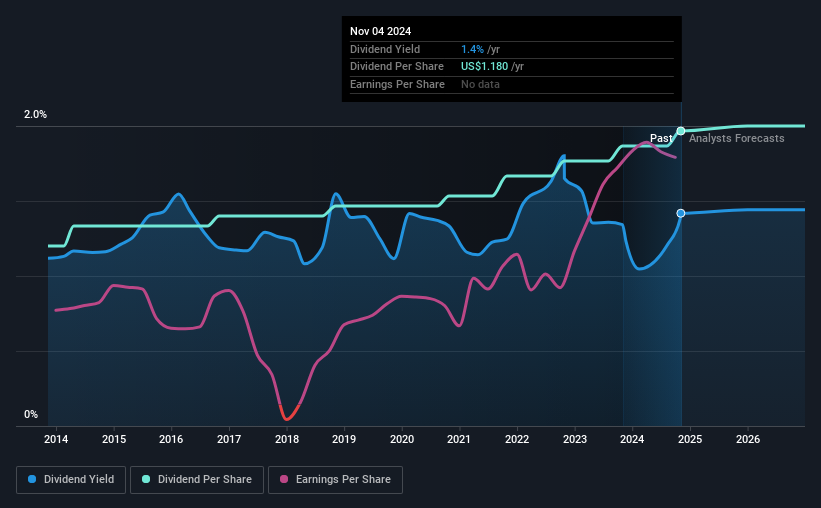
Tennant Company (NYSE:TNC) has announced that it will be increasing its dividend from last year's comparable payment on the 16th of December to $0.295. This takes the annual payment to 1.4% of the current stock price, which is about average for the industry.
View our latest analysis for Tennant
Tennant's Projected Earnings Seem Likely To Cover Future Distributions
We like a dividend to be consistent over the long term, so checking whether it is sustainable is important. However, prior to this announcement, Tennant's dividend was comfortably covered by both cash flow and earnings. As a result, a large proportion of what it earned was being reinvested back into the business.
Over the next year, EPS is forecast to fall by 1.6%. If the dividend continues along the path it has been on recently, we estimate the payout ratio could be 21%, which is comfortable for the company to continue in the future.

Tennant Has A Solid Track Record
The company has an extended history of paying stable dividends. The dividend has gone from an annual total of $0.72 in 2014 to the most recent total annual payment of $1.18. This implies that the company grew its distributions at a yearly rate of about 5.1% over that duration. Dividends have grown at a reasonable rate over this period, and without any major cuts in the payment over time, we think this is an attractive combination as it provides a nice boost to shareholder returns.
The Dividend Looks Likely To Grow
Some investors will be chomping at the bit to buy some of the company's stock based on its dividend history. It's encouraging to see that Tennant has been growing its earnings per share at 19% a year over the past five years. A low payout ratio and decent growth suggests that the company is reinvesting well, and it also has plenty of room to increase the dividend over time.
Tennant Looks Like A Great Dividend Stock
Overall, we think this could be an attractive income stock, and it is only getting better by paying a higher dividend this year. The distributions are easily covered by earnings, and there is plenty of cash being generated as well. However, it is worth noting that the earnings are expected to fall over the next year, which may not change the long term outlook, but could affect the dividend payment in the next 12 months. All in all, this checks a lot of the boxes we look for when choosing an income stock.
Market movements attest to how highly valued a consistent dividend policy is compared to one which is more unpredictable. Meanwhile, despite the importance of dividend payments, they are not the only factors our readers should know when assessing a company. You can also discover whether shareholders are aligned with insider interests by checking our visualisation of insider shareholdings and trades in Tennant stock. Looking for more high-yielding dividend ideas? Try our collection of strong dividend payers.
Valuation is complex, but we're here to simplify it.
Discover if Tennant might be undervalued or overvalued with our detailed analysis, featuring fair value estimates, potential risks, dividends, insider trades, and its financial condition.
Access Free AnalysisHave feedback on this article? Concerned about the content? Get in touch with us directly. Alternatively, email editorial-team (at) simplywallst.com.
This article by Simply Wall St is general in nature. We provide commentary based on historical data and analyst forecasts only using an unbiased methodology and our articles are not intended to be financial advice. It does not constitute a recommendation to buy or sell any stock, and does not take account of your objectives, or your financial situation. We aim to bring you long-term focused analysis driven by fundamental data. Note that our analysis may not factor in the latest price-sensitive company announcements or qualitative material. Simply Wall St has no position in any stocks mentioned.
About NYSE:TNC
Tennant
Designs, manufactures, and markets floor cleaning equipment in the Americas, Europe, the Middle East, Africa, and the Asia Pacific.
Very undervalued with flawless balance sheet and pays a dividend.
Similar Companies
Market Insights
Community Narratives



